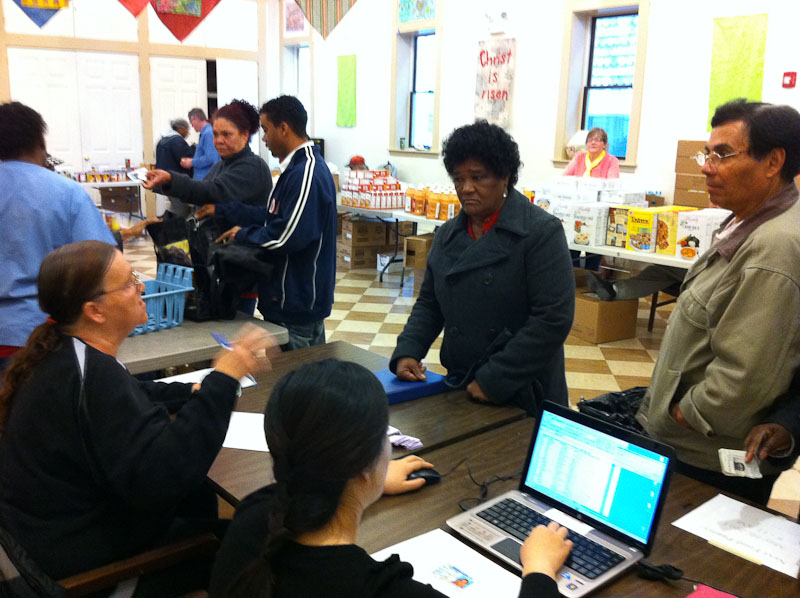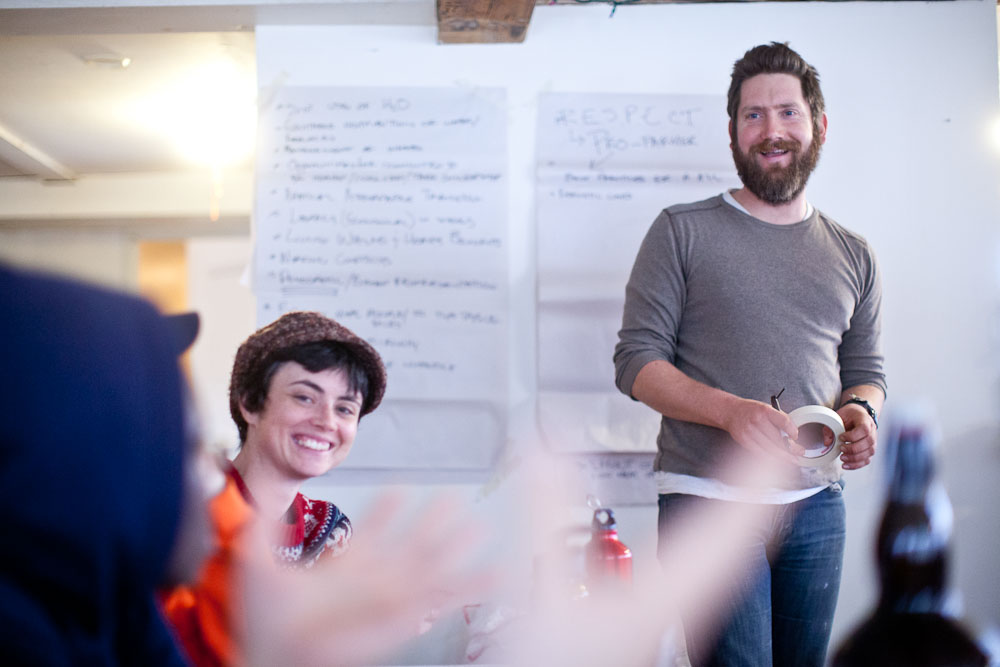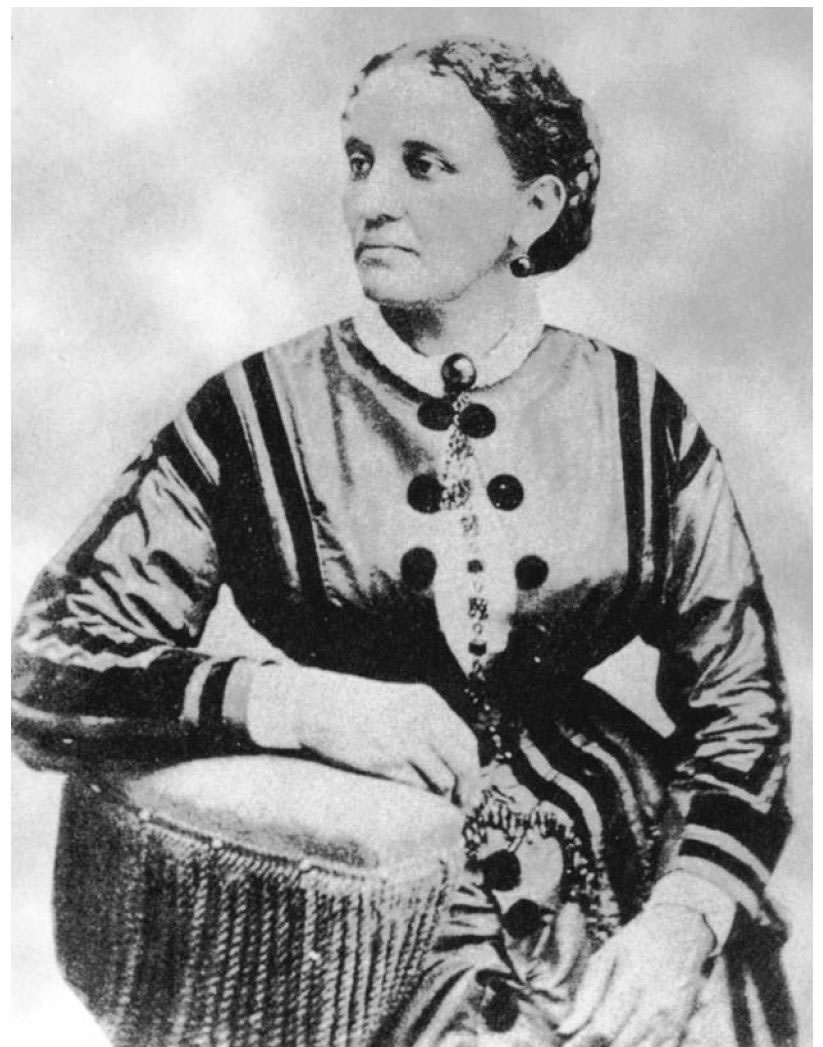Just? Or Just for the Rich?
Before farm school, I ran a food pantry in South Boston that mainly serviced two nearby housing projects. Every two weeks, we distributed 10,000 pounds of food to nearly 1,000 people struggling to make ends meet. But for each person who regarded the pantry as a temporary stopgap measure, there were 20 others who were locked in a more structural poverty and for whom trips to pantries were as routine as trips to the grocery store. Though I felt of service, I couldn’t shake the feeling that our efforts were doing little to address the underlying issues that forced our clients to line up in the predawn hours week after week waiting for their bags of food.So now that I’m at farm school working earnestly toward the righteous cause of providing healthy and sustainable food, all conflict is avoided right? Not exactly. Thanks to an intentionally provocative class on Food Justice led by Tyson, our head grower, it turns out I have traded a service that does little to empower poor people for a profession to often outright ignores and exploits them.
Though I felt of service, I couldn’t shake the feeling that our efforts were doing little to address the underlying issues that forced our clients to line up in the predawn hours week after week waiting for their bags of food.So now that I’m at farm school working earnestly toward the righteous cause of providing healthy and sustainable food, all conflict is avoided right? Not exactly. Thanks to an intentionally provocative class on Food Justice led by Tyson, our head grower, it turns out I have traded a service that does little to empower poor people for a profession to often outright ignores and exploits them. The first blow to my newfound professiont is the issue is of equal food access. As it stands right now, the local food movement is largely a product of well-off college-educated folks serving other well-off college-educated folks. Our class of student-farmers at the farm school is no exception. And take one trip to your farmer’s market and you’ll realize 'the movement' is more about expensive mojito quinoa salads and artisan cheeses and less about Twinkie alternatives for the 29% of poor kids who haven’t eaten a vegetable in the last week. Local food products are simply more expensive to produce and are therefore out of reach for many people. And I think I’m hard pressed to call it a movement if everyone‘s not at the table.Which ironically points to the second point: many of the people who can’t afford local, organic food are the farm workers themselves. Agriculture is notorious for exploiting workers, especially immigrant labor. According to the San Francisco Bay Guardian, the average annual salary of a farm worker in California (where organic was born) is around $8,500, to say nothing of the lack of benefits and abysmal housing conditions. And it turns out that the organic movement hasn’t been able to do much better.By forgoing pesticides and fertilizers, organic farms rely on back breaking “stoop labor” – that is, manual cultivation and harvesting. This costs money, and there’s a limit to how much more expensive organic food can be before it simply doesn’t sell. So though there have been efforts here and there to make organic standards include protections for workers, market forces and our own national laws have worked against this.Add to this conflict the issue of messaging.During class, Tyson showed us a video that nearly made me puke. Over a tableau of idyllic agrarian scenery and moody guitar, a sympathetic male voice urges us to consider our beautiful but limited ‘living planet,’ the disappearing rain forests, the melting arctic ice and the challenge of sustainably feeding 7 billion people. ‘Right on,’ I think. But the video continues (watch below if you'd like) and breaks my heart:https://vimeo.com/27266291“We pledge to do our part. We’re Monsanto. And we’re working with farmers and partners worldwide to realize a vision for sustainable agriculture.”Monsanto. The reviled multinational corporation associated with the worst abuses of industrial agriculture and corporate greed. But Google ‘Monsanto’ and the first hit you get is “sustainable agriculture.”This is an example of what Adam Davidson spoke to us about at Stone Barns last week: how big agriculture uses the local food movement as a focus group to determine what customers want. Once they do, they deploy their nimble marketing machine to beat us at our own game.What kills me is that Monsanto’s doublespeak video uses the same words I use to describe all I find sacred about serving the land and our fellow man. It’s a sad reminder that words aren’t intellectual property and language isn’t absolute.I left Tyson’s class with my idealism bruised and I’ve been moping all week (just ask Dina). My relative privilege puts me in the company of others offering stale perspectives on the sustainable agriculture movement. What’s already been done to help our planet comes at the expense of exploited workers and mostly serves the elite. And big agriculture seems poised to coopt and destroy whatever profit or good intentions are left in local and organic.Sigh. It was much easier to have convictions with blinders on.But as we’re coming to the end of the year, perhaps taking stock of where I stand is good, if painful. I’m on Christmas break from school for the next two weeks, so last Saturday, Dina and I celebrated my temporary return to urban life with our old stand-by date: sushi and a trip to the movies. We saw Lincoln, and if there is some hope for me in this “movement,” I think I comes from the struggle for civil rights.While our current economy is no longer explicitly dependent upon the exploitation of an entire race of people, it is now dependent upon exploiting the defenseless and limited resources of our natural world. And as much as we can’t address all the injustices or answer all the questions about where this movement is going, the same was true regarding abolishing slavery in 1865. What would a country of freed blacks would look like? Would they vote? Intermarry with whites?
The first blow to my newfound professiont is the issue is of equal food access. As it stands right now, the local food movement is largely a product of well-off college-educated folks serving other well-off college-educated folks. Our class of student-farmers at the farm school is no exception. And take one trip to your farmer’s market and you’ll realize 'the movement' is more about expensive mojito quinoa salads and artisan cheeses and less about Twinkie alternatives for the 29% of poor kids who haven’t eaten a vegetable in the last week. Local food products are simply more expensive to produce and are therefore out of reach for many people. And I think I’m hard pressed to call it a movement if everyone‘s not at the table.Which ironically points to the second point: many of the people who can’t afford local, organic food are the farm workers themselves. Agriculture is notorious for exploiting workers, especially immigrant labor. According to the San Francisco Bay Guardian, the average annual salary of a farm worker in California (where organic was born) is around $8,500, to say nothing of the lack of benefits and abysmal housing conditions. And it turns out that the organic movement hasn’t been able to do much better.By forgoing pesticides and fertilizers, organic farms rely on back breaking “stoop labor” – that is, manual cultivation and harvesting. This costs money, and there’s a limit to how much more expensive organic food can be before it simply doesn’t sell. So though there have been efforts here and there to make organic standards include protections for workers, market forces and our own national laws have worked against this.Add to this conflict the issue of messaging.During class, Tyson showed us a video that nearly made me puke. Over a tableau of idyllic agrarian scenery and moody guitar, a sympathetic male voice urges us to consider our beautiful but limited ‘living planet,’ the disappearing rain forests, the melting arctic ice and the challenge of sustainably feeding 7 billion people. ‘Right on,’ I think. But the video continues (watch below if you'd like) and breaks my heart:https://vimeo.com/27266291“We pledge to do our part. We’re Monsanto. And we’re working with farmers and partners worldwide to realize a vision for sustainable agriculture.”Monsanto. The reviled multinational corporation associated with the worst abuses of industrial agriculture and corporate greed. But Google ‘Monsanto’ and the first hit you get is “sustainable agriculture.”This is an example of what Adam Davidson spoke to us about at Stone Barns last week: how big agriculture uses the local food movement as a focus group to determine what customers want. Once they do, they deploy their nimble marketing machine to beat us at our own game.What kills me is that Monsanto’s doublespeak video uses the same words I use to describe all I find sacred about serving the land and our fellow man. It’s a sad reminder that words aren’t intellectual property and language isn’t absolute.I left Tyson’s class with my idealism bruised and I’ve been moping all week (just ask Dina). My relative privilege puts me in the company of others offering stale perspectives on the sustainable agriculture movement. What’s already been done to help our planet comes at the expense of exploited workers and mostly serves the elite. And big agriculture seems poised to coopt and destroy whatever profit or good intentions are left in local and organic.Sigh. It was much easier to have convictions with blinders on.But as we’re coming to the end of the year, perhaps taking stock of where I stand is good, if painful. I’m on Christmas break from school for the next two weeks, so last Saturday, Dina and I celebrated my temporary return to urban life with our old stand-by date: sushi and a trip to the movies. We saw Lincoln, and if there is some hope for me in this “movement,” I think I comes from the struggle for civil rights.While our current economy is no longer explicitly dependent upon the exploitation of an entire race of people, it is now dependent upon exploiting the defenseless and limited resources of our natural world. And as much as we can’t address all the injustices or answer all the questions about where this movement is going, the same was true regarding abolishing slavery in 1865. What would a country of freed blacks would look like? Would they vote? Intermarry with whites? In light of all these unresolved questions, on the eve of the vote for the 13th amendment Stephen Spielberg’s Lincoln asked his wife’s black servant Elizabeth Keckley if she ‘feared for her people’ should they suddenly be freed by the 13th amendment, knowing that many white people didn’t want the system to change.She replied evenly, “I have never heard of anyone ask what freedom will bring. Freedom first.”Just as Americans in 1865 could hardly imagine what a country of freed blacks would look like, I think I’m having a similar failure of imagination with regards to how we feed a ballooning population both sustainably and equitably. I take heart knowing that profound cultural change is possible (we have a black man sitting as President in the White House after all), but I worry that we don't have 150 years to learn how to live harmoniously within the limits of our natural world. Bottom line, we have to rethink 'cheap' food and 'cheap' labor but if we remain paralyzed by these problems, Nature will make her limits – and demands – very clear.For those of you who made it this far, thanks for sticking through the photo-light rant. The rest of the images from the week can be found HERE.
In light of all these unresolved questions, on the eve of the vote for the 13th amendment Stephen Spielberg’s Lincoln asked his wife’s black servant Elizabeth Keckley if she ‘feared for her people’ should they suddenly be freed by the 13th amendment, knowing that many white people didn’t want the system to change.She replied evenly, “I have never heard of anyone ask what freedom will bring. Freedom first.”Just as Americans in 1865 could hardly imagine what a country of freed blacks would look like, I think I’m having a similar failure of imagination with regards to how we feed a ballooning population both sustainably and equitably. I take heart knowing that profound cultural change is possible (we have a black man sitting as President in the White House after all), but I worry that we don't have 150 years to learn how to live harmoniously within the limits of our natural world. Bottom line, we have to rethink 'cheap' food and 'cheap' labor but if we remain paralyzed by these problems, Nature will make her limits – and demands – very clear.For those of you who made it this far, thanks for sticking through the photo-light rant. The rest of the images from the week can be found HERE.

